A non-religious wedding ceremony script provides a meaningful guide for couples seeking a personalized‚ inclusive experience without religious elements‚ focusing on love‚ commitment‚ and shared values․
Definition and Purpose of a Non-Religious Ceremony
A non-religious ceremony is a wedding celebration that focuses on personal values‚ love‚ and commitment without religious elements․ Its purpose is to create a meaningful‚ inclusive experience‚ allowing couples to express their bond through vows‚ readings‚ and rituals that reflect their unique journey and beliefs․ It emphasizes equality‚ personalization‚ and emotional connection‚ making it a popular choice for couples seeking a modern‚ secular approach to marriage․
Overview of the Structure of a Typical Non-Religious Ceremony
A typical non-religious ceremony includes a processional‚ opening remarks‚ vows‚ ring exchange‚ readings‚ and a closing statement․ It may also incorporate personalized rituals or cultural elements․ The structure is flexible‚ allowing couples to tailor each part to reflect their unique story and values․ This format ensures a meaningful and inclusive celebration‚ focusing on the couple’s commitment and shared future without religious doctrine‚ making it adaptable to various styles and preferences․
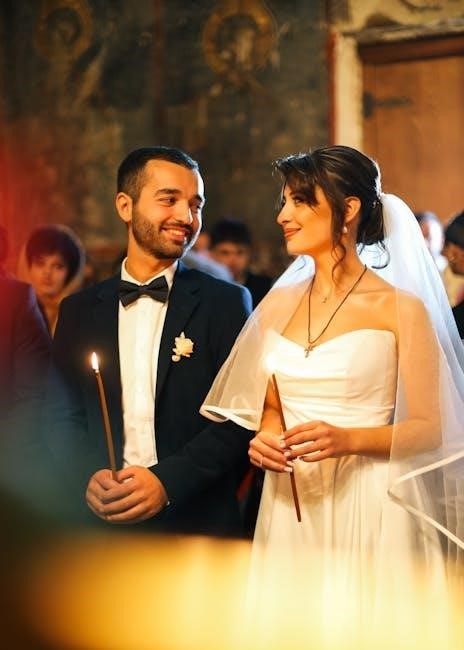
Advantages of Using a Script for a Non-Religious Ceremony
Using a script for a non-religious ceremony ensures a structured and organized celebration‚ providing clear guidance for the officiant and participants․ It helps maintain focus on key moments like vows and readings‚ ensuring nothing is missed․ A script also allows for personalization‚ enabling couples to tailor the ceremony to their unique story and values․ Additionally‚ it reduces anxiety by offering a clear roadmap‚ ensuring the ceremony flows smoothly and meets legal requirements while remaining meaningful and heartfelt․
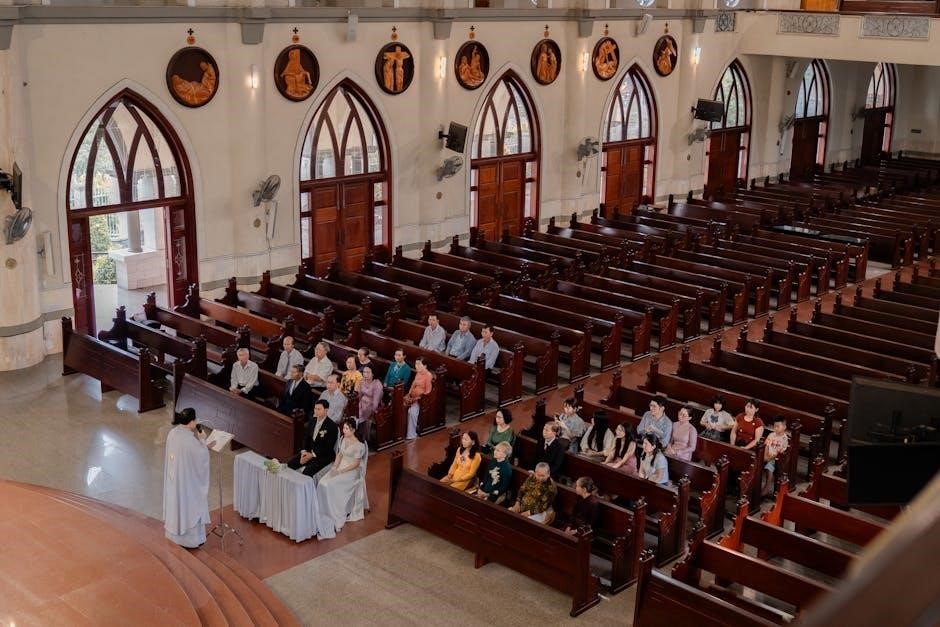
Key Elements of a Non-Religious Wedding Ceremony Script
A non-religious ceremony script typically includes a processional‚ opening remarks‚ vows‚ ring exchange‚ readings‚ and a declaration of marriage‚ ensuring a meaningful and structured celebration of love and commitment․
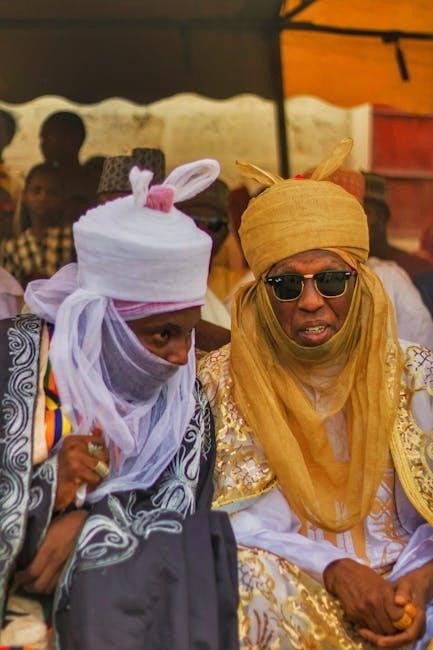
Processional and Opening Remarks
The processional sets the tone‚ with the wedding party entering to music‚ followed by opening remarks from the officiant․ These remarks welcome guests‚ outline the ceremony’s purpose‚ and establish a heartfelt‚ inclusive atmosphere․ The officiant may speak about love‚ commitment‚ or shared values‚ creating a meaningful start without religious references․ This section is customizable‚ allowing couples to personalize the opening with unique touches or cultural elements‚ ensuring the ceremony reflects their individuality and vision for the future together․
Vows and Ring Exchange
The vows and ring exchange are heartfelt moments where couples pledge their commitment․ Personalized vows allow them to express unique promises‚ reflecting their relationship and future aspirations․ The ring exchange symbolizes eternal love and partnership․ Officiants guide this meaningful exchange‚ ensuring a sincere and emotional experience․ Couples can tailor their vows to reflect personal values‚ making the ceremony deeply intimate and authentic‚ free from religious traditions‚ while maintaining the profound significance of the promises they make to one another․
Readings and Speeches
Readings and speeches add depth and personalization to a non-religious ceremony․ Couples often choose meaningful poems‚ literary passages‚ or heartfelt messages that resonate with their journey․ Friends or family may contribute speeches‚ sharing anecdotes or well-wishes․ These elements create a connection with guests and celebrate the couple’s love story․ Readings can also reflect shared values or beliefs‚ making the ceremony inclusive and authentic‚ while speeches infuse warmth and intimacy‚ honoring the couple’s unique bond and future together․

Personalizing Your Non-Religious Ceremony Script
Personalizing your ceremony script allows you to infuse meaningful elements‚ such as personal vows‚ heartfelt readings‚ and unique rituals‚ reflecting your story and values for an authentic celebration․
How to Incorporate Personal Vows and Promises
Incorporating personal vows and promises into your non-religious ceremony adds a heartfelt touch․ Couples can express their unique commitment by writing individualized promises‚ reflecting their personal journey and future aspirations․ These vows can be shared aloud during the ceremony‚ creating a sincere and intimate moment․ Many scripts offer placeholders for these personal elements‚ allowing couples to tailor their promises to their relationship․ This customization ensures the ceremony feels deeply personal and meaningful‚ making the exchange of vows a standout moment․ Additionally‚ couples may choose to include mutual promises‚ reinforcing their partnership’s foundation․ By doing so‚ they craft a ceremony that truly represents their bond and vision for the future together․
Choosing Meaningful Readings and Poems
Selecting meaningful readings and poems for your non-religious ceremony enhances its emotional depth․ Opt for literature‚ poetry‚ or passages that resonate with your values and love story․ Themes of love‚ commitment‚ and unity are popular choices․ Personalize by including writings that reflect your journey together or shared beliefs․ Many scripts offer suggestions‚ or you can work with your officiant to curate unique pieces․ These elements add a touching‚ individualized flair to your celebration‚ making it unforgettable for you and your guests․
Adding Unique Rituals or Symbols
Incorporate meaningful rituals or symbols to personalize your non-religious ceremony․ Options like handfasting‚ unity candles‚ or blending sands represent unity and commitment․ Personal items‚ such as heirlooms or handwritten letters‚ can also be included․ These elements add depth and individuality‚ reflecting your unique journey and values․ Rituals and symbols create memorable moments‚ making your ceremony distinctive and heartfelt․ They offer creative ways to celebrate your bond without religious elements‚ ensuring a truly personalized experience․
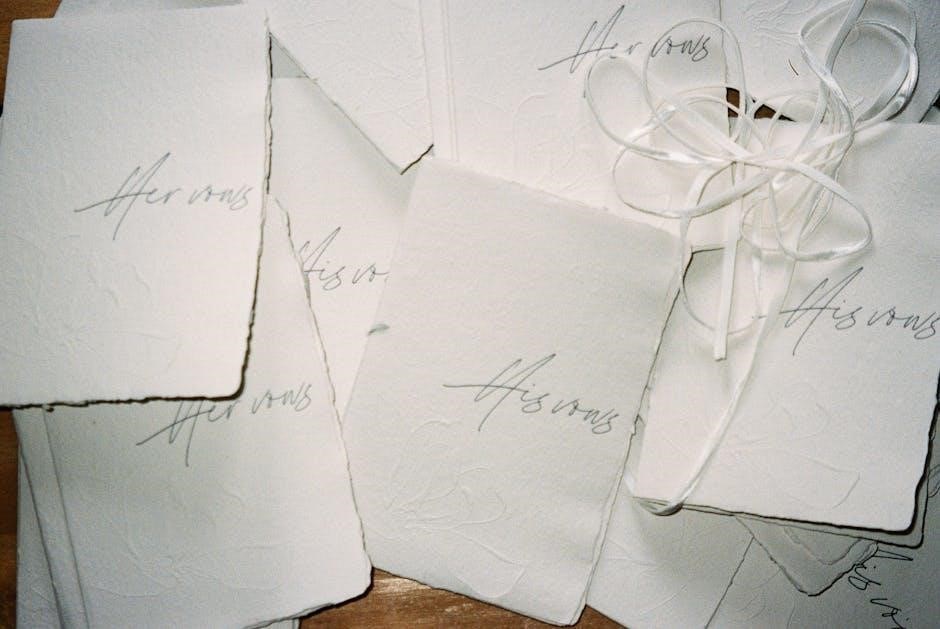
The Role of the Officiant in a Non-Religious Ceremony
The officiant guides the ceremony‚ ensuring legality and flow․ They personalize the script to reflect the couple’s values‚ creating a meaningful‚ inclusive experience for all attendees․
Responsibilities of the Officiant
The officiant ensures the ceremony adheres to legal requirements‚ personalizes the script to reflect the couple’s values‚ and guides the flow of the event․ They prepare the couple by reviewing vows and readings‚ coordinate with participants‚ and create a meaningful atmosphere․ The officiant also verifies documentation and witnesses the exchange of vows and rings‚ ensuring the ceremony is both legally binding and emotionally resonant for all involved․
Tips for Preparing the Officiant
Ensure the officiant reviews and understands the ceremony script beforehand․ Provide clear instructions on tone‚ pacing‚ and delivery․ Schedule a rehearsal to familiarize them with the venue and order of events․ Share the couple’s personal story and values to personalize the ceremony․ Confirm legal requirements and documentation․ Encourage practicing vows and readings aloud․ Offer guidance on handling unexpected moments and ensuring a smooth flow․ Provide a finalized PDF script for easy reference during preparation․
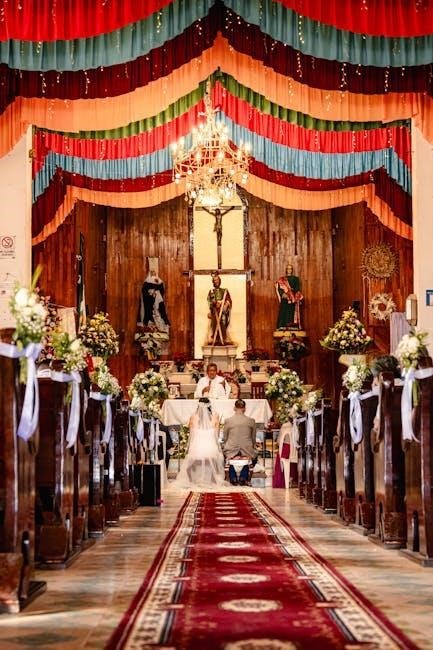
Legal and Formal Aspects of a Non-Religious Ceremony
Non-religious ceremonies must meet legal marriage requirements‚ including a valid license‚ witnesses‚ and proper documentation․ A PDF script can help ensure all legal elements are seamlessly incorporated․
Understanding the Legal Requirements
Non-religious ceremonies must adhere to legal marriage requirements‚ including obtaining a valid marriage license and ensuring the presence of witnesses․ The officiant must be legally authorized to perform the ceremony‚ whether a professional celebrant or a designated friend or family member․ Proper documentation‚ such as signing the marriage certificate‚ is essential․ Couples should verify local laws to ensure compliance․ A PDF script can help organize these legal elements seamlessly while maintaining a meaningful and personalized ceremony experience․
Ensuring the Ceremony is Legally Binding
A non-religious ceremony must include key legal elements to be recognized as valid․ These typically involve obtaining a marriage license beforehand and having at least two witnesses present․ The officiant must pronounce the couple as legally married and ensure the marriage certificate is signed and filed․ A PDF script can help structure these requirements seamlessly‚ ensuring the ceremony remains both meaningful and legally binding while adhering to local marriage laws and regulations․
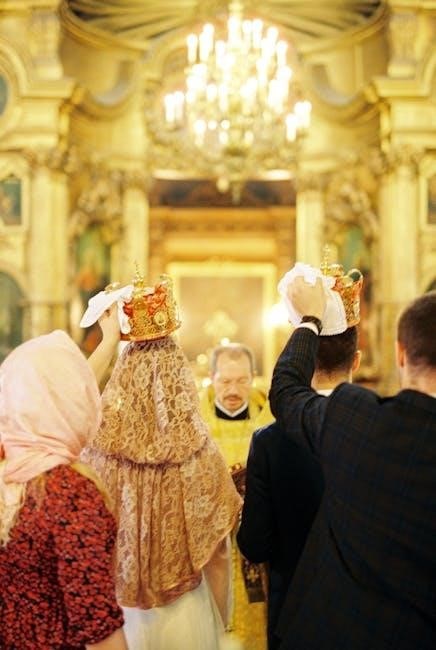
Cultural and Personal Touches in a Non-Religious Ceremony
Couples can celebrate their heritage by incorporating cultural rituals or attire‚ while personal vows and unique rituals reflect their identity and values‚ creating a meaningful‚ bespoke ceremony․
Incorporating Cultural Traditions
Cultural traditions enrich non-religious ceremonies by honoring heritage․ Couples can include rituals like handfasting‚ unity candles‚ or blessings from elders․ Wearing traditional attire or incorporating cultural music reflects identity․ These practices create a meaningful connection to roots while maintaining a secular framework․ Personalized scripts allow couples to weave in customs‚ ensuring the ceremony feels authentic and inclusive‚ blending tradition with personal style for a unique celebration of love and shared values․
Reflecting Personal Beliefs and Values
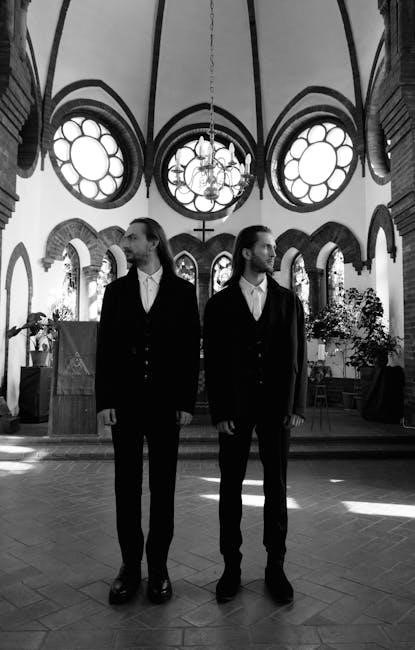
A non-religious ceremony script allows couples to express their personal beliefs and values‚ creating a unique and meaningful experience․ By incorporating personal vows‚ readings‚ and symbols‚ couples can reflect their individuality and shared vision․ This approach ensures the ceremony aligns with their worldview‚ whether secular‚ humanist‚ or philosophical‚ making it deeply personal and authentic‚ while respecting all guests’ diverse backgrounds and beliefs in a heartfelt celebration of love and commitment․
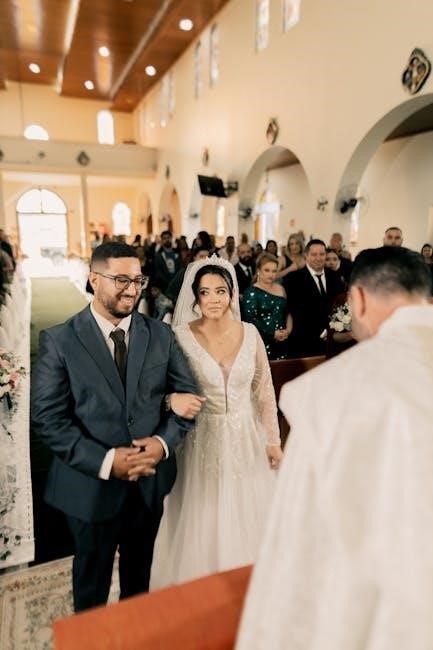
Popular Non-Religious Wedding Ceremony Scripts
Popular non-religious scripts offer customizable‚ inclusive ceremonies in formats like PDF‚ blending love and personal style for unique celebrations‚ allowing couples to personalize their day with meaningful content․
Examples of Modern and Inclusive Scripts
Modern non-religious scripts emphasize flexibility and inclusivity‚ catering to diverse styles and beliefs․ Couples can choose from heartfelt vows‚ meaningful readings‚ and symbolic rituals like handfasting or unity candles․ These scripts often include customizable elements‚ such as personal promises and cultural traditions‚ allowing for a truly unique celebration․ Many PDF templates also offer LGBTQ+-friendly language and secular ceremonies that focus on emotional connection and commitment․ They provide a foundation for couples to craft a ceremony that reflects their individuality and shared values‚ ensuring a memorable and personal experience for all involved․
- Handfasting rituals
- Personalized vows
- Cultural traditions
- Unity ceremonies
How to Choose the Right Script for Your Wedding
Choosing the perfect non-religious wedding script involves reflecting on your personal style‚ values‚ and vision for the ceremony․ Start by reviewing sample scripts to identify tones and structures that resonate with you․ Consider the length‚ language‚ and level of formality that align with your wedding theme․ Tailor the script to include meaningful elements‚ such as personal vows or cultural traditions‚ ensuring it reflects your unique story․ Finally‚ seek input from your partner and officiant to refine the script into a cohesive‚ heartfelt celebration of your commitment․
- Reflect on personal style and values
- Review sample scripts
- Customize to include meaningful elements
A non-religious wedding ceremony script offers a heartfelt‚ personalized way to celebrate love and commitment‚ allowing couples to craft a meaningful experience that reflects their unique journey․
Final Thoughts on Crafting a Meaningful Non-Religious Ceremony
Crafting a meaningful non-religious ceremony involves personalizing the script to reflect the couple’s love story‚ values‚ and beliefs․ Incorporating personal vows‚ readings‚ and unique rituals ensures the ceremony feels authentic and intimate․ The officiant plays a key role in guiding the flow‚ while legal requirements must be met to make the union official․ By focusing on love‚ commitment‚ and unity‚ couples can create a celebration that resonates with them and their guests‚ making the day truly unforgettable and heartfelt․